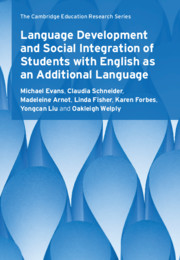Book contents
- Language Development and Social Integration of Students with English as an Additional Language
- Language Development and Social Integration of Students with English as an Additional Language
- Copyright page
- Contents
- Figures
- Tables
- Acknowledgements
- 1 Introduction
- 2 Education and Social Integration for EAL Students
- 3 The International, National and Regional Policy Context of Social Integration in Schools
- 4 The Methodology of Researching EAL
- 5 Progression in Language, Learning and Social Integration
- 6 Towards an Inclusive Pedagogy for EAL in the Multilingual Classroom
- 7 Rethinking Home–School Communication for Parents of Migrant Children
- 8 Conclusion
- References
- Index
2 - Education and Social Integration for EAL Students
Narratives and Debates
Published online by Cambridge University Press: 03 July 2020
- Language Development and Social Integration of Students with English as an Additional Language
- Language Development and Social Integration of Students with English as an Additional Language
- Copyright page
- Contents
- Figures
- Tables
- Acknowledgements
- 1 Introduction
- 2 Education and Social Integration for EAL Students
- 3 The International, National and Regional Policy Context of Social Integration in Schools
- 4 The Methodology of Researching EAL
- 5 Progression in Language, Learning and Social Integration
- 6 Towards an Inclusive Pedagogy for EAL in the Multilingual Classroom
- 7 Rethinking Home–School Communication for Parents of Migrant Children
- 8 Conclusion
- References
- Index
Summary
This chapter examines the narratives (media, policy and statistical) around the notion of the ‘linguistic other’ in England and elsewhere in Europe. We argue that these narratives are closely bound up with the way nation states define their policies for social integration of migrant communities and, in particular, migrant children in schools. At the heart of the debates around conflicting narratives about the role of schools in this context is the question of linguistic diversity and second (or host) language development. Also in this chapter we review, from a sociological perspective, how researchers and policy-makers have endeavoured to understand the concept and practice of social integration in this context. In particular, we highlight the tensions between the focus on micro-level experience and on the macro-level socio-political implications. We provide a review of recent empirical studies on EAL internationally and reflect on current issues in light of recent policy developments. We discuss the variations that can be found across Europe in terms of mainstreaming and inclusion.
Keywords
- Type
- Chapter
- Information
- Language Development and Social Integration of Students with English as an Additional Language , pp. 23 - 50Publisher: Cambridge University PressPrint publication year: 2020



